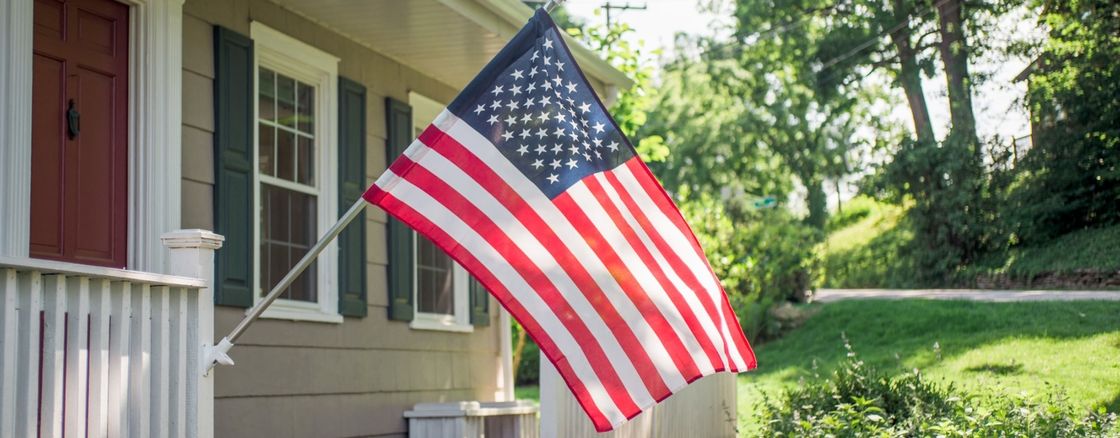What Are the Closing Costs of a VA Loan?
Written by:
Andrew Tavin
Andrew Tavin
Personal Finance Writer
Andrew Tavin a contributing writer for Own Up.
See full bio
Fact Checked by:
Mike Tassone
Mike is a Co-Founder and Chief Operating Officer of Own Up. He has expertise in all areas of residential lending, having led operations for a top 40 lender in the United States.
See full bio

Fast Links
- What Are the Required VA Closing Costs for a Loan?
- How Expensive Are VA Loan Closing Costs?
- How Expensive is the VA Loan Funding Fee?
- What is the 1% Rule?
- What are Seller Concessions and How Do They Differ With VA Home Loans?
- What are VA Non-Allowable Fees?
- Can Refinancing Your VA Mortgage Lead to Lower Costs?
- The Bottom Line
The GI bill passed in the wake of World War II established the Veterans Affairs home loan program. When hearing about this program, you may have an image of soldiers returning stateside from the war to then go on to purchase homes with their high school sweethearts, and VA loans may be a big part of why.
To this day veterans and active duty service members can access mortgages backed by the Department of Veterans Affairs in order to receive loan terms more favorable than they could access otherwise.
Although VA loans come with many benefits, borrowers should still be aware of closing costs like origination fees, VA funding fees, and appraisal fees. By taking proper steps, service members and veterans can minimize their costs and prepare themselves for closing.
What Are the Required VA Closing Costs for a Loan?
VA-backed loans share many of the same closing fees as conventional mortgages. That’s because most VA loans are borrowed from a bank, credit union, or broker that also offers conventional loans.
In the case of VA loans, the lender determines the closing costs according to the borrower’s finances, the information in their credit report, and the standards set by the VA. Closing costs can include loan origination fees for the underwriting process, title insurance, inspection fees, appraisal fees, and more.
There are at least two major differences, however, between a VA loan and a conventional loan: the additional cost of the VA loan funding fee and the lack of a down payment requirement.
Let’s take a closer look at the fees and closing costs affiliated with a VA loan below.
Origination Fee
The origination fee is charged by the lender to cover the costs of the underwriting process. Lenders require the origination fee be paid at the time of closing, though you may be allowed to roll it into the total cost of the mortgage loan. For VA loans, the lender fees cannot exceed 1% of the loan amount.
Be aware, however, that if you opt to roll additional costs into the mortgage loan amount, you’ll end up paying more in interest across the life of the loan.
Inspection Fee
Inspections are typically not required for VA loans, depending on your state and if certain conditions are met during the appraisal process. Even if you don’t need an inspection to purchase your under-contract property, it may still be wise to go forward with one. During an inspection, the home inspector will examine the property to make sure there aren’t any significant issues that need addressing.
If the home needs major repairs, or a major undisclosed issue like termites is found, it’s possible that the sale price could be renegotiated, the seller could pay for the repairs, or the offer could be withdrawn entirely.
Appraisal Fee
Lenders require an appraisal to be certain that the property under contract is worth the amount of the mortgage. That’s because the lender is going to use the house as collateral to recover their losses if the borrower stops making mortgage payments.
Title Insurance
This is a separate cost beyond the mortgage insurance that is required for many conventional loans and all FHA loans, but not for VA loans; however, many lenders may require it and many buyer’s may opt for owner’s coverage.
Title insurance provides a guarantee for the mortgage lender in case the ownership of the home turns out to be disputed. The borrower will be required to cover the cost of the title insurance as part of the closing costs. There will also be additional related fees, like the title search fee and recording fees, to make sure ownership of the property has been tracked properly.
Discount Points
A borrower can choose to put down more money upfront as part of the closing costs. These “discount points,” also known as “paying down the rate,” can reduce the rate of the loan. Generally the more you’re willing to pay upfront, the better rate you’ll receive.
Property Taxes
Many borrowers will pay the first year or so of property taxes at the time of closing along with any other taxes required in the home sale process. In some cases, the seller may pay some or all of these costs, depending on the time of year you close and what happens during closing negotiations.
VA Loan Funding Fee
VA loans have a unique funding fee beyond what other types of mortgages require.
The VA funding fee offsets the cost of the VA’s loan guarantee program. Your down payment amount and whether this is your first time as a VA borrower will impact the amount of your funding fee. VA borrowers can choose to either pay the full fee at closing with other closing costs or finance the fee as part of the loan.
If you receive VA disability compensation, have earned a Purple Heart, or are the surviving spouse of a veteran who received disability compensation, you may be exempt from paying the funding fee.
VA Loan Down Payments
One of the main advantages of VA loans is that they do not require a down payment. You can still choose to contribute a down payment to the transaction, however.
The larger your down payment, the better loan rates you’ll receive. For service members and veterans who do not have the savings to afford a down payment, VA loans may be their only path to homeownership.
How Expensive Are VA Loan Closing Costs?
Many closing costs will vary depending on the specifics of the home purchase, but the VA funding fee is a relatively consistent percentage determined by the VA.
How Expensive is the VA Loan Funding Fee?
Unlike the other closing costs associated with a VA loan, which are determined by the lender, the VA loan funding fee is set by and paid to the Department of Veterans Affairs. Like many other closing costs, it is calculated as a percentage of the total mortgage cost.
You can check the VA website to learn what you can expect to pay for different types of loans under different circumstances.
While VA loans are unique in allowing homebuyers to avoid a down payment, there are benefits to making one anyway. If you look at the VA funding fee guide, you’ll see that choosing to make a down payment will lead to a smaller funding fee, especially if you’re able to put down 10% or more.
The funding fee will also be lower if this is the first time you’re taking advantage of the program.
What is the 1% Rule?
The VA caps the origination fee a lender can charge for a VA loan at 1% of the cost of the mortgage.
Be aware, though, that this does not apply to third-party fees like appraisal fees, inspection fees, and title insurance.
What are Seller Concessions and How Do They Differ With VA Home Loans?
The seller can agree to pay a portion of the buyer’s closing costs. This is called a seller concession and may be part of a larger agreement to complete a sale.
VA loans have a limit on seller concessions of 4% of the cost of the loan, not including costs sellers typically cover in the area of the sale. This is to avoid a situation where a VA-backed borrower is stuck with a loan they can not afford to pay back.
What are VA Non-Allowable Fees?
There are certain fees a lender cannot charge a VA loan borrower. These include attorney fees, brokerage fees, and prepayment penalties. As previously mentioned, a lender also cannot require a borrower to pay for origination fees that exceed 1% of the loan total.
Can Refinancing Your VA Mortgage Lead to Lower Costs?
VA loan borrowers can reduce their interest payments with an Interest Rate Reduction Refinance Loan, or IRRRL.
While these VA refinancing loans can lead to smaller monthly payments and lower interest rates, they require another round of closing costs, including an additional VA funding fee.
It’s important to do the math and consult with an expert to be certain that you’ll actually save money on your mortgage rates even after the closing costs are accounted for.
The Bottom Line
“Before beginning their home search and loan application process, veterans should conduct thorough research and consultation,” advises attorney Jonathan Feniak. “Working with a trusted financial advisor or a knowledgeable real estate agent familiar with the VA loan process can be very beneficial.”
With your research in hand and your finances prepared, you’ll be ready to get the best loan deal you possibly can.


